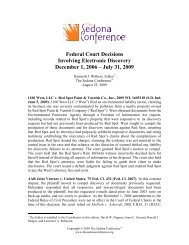Chambers Handbook for Judges - Federal Judicial Center
Chambers Handbook for Judges - Federal Judicial Center
Chambers Handbook for Judges - Federal Judicial Center
Create successful ePaper yourself
Turn your PDF publications into a flip-book with our unique Google optimized e-Paper software.
4. Nonbinding Summary Jury Trial<br />
The court conducts an abbreviated trial be<strong>for</strong>e a regularly impaneled<br />
jury. The jury offers a nonbinding verdict, and the lawyers are generally<br />
permitted to question the jurors about their decision. Settlement<br />
is promoted by giving the parties an idea of the likely outcome if they<br />
go to trial. If the case does not settle, the parties may proceed to trial.<br />
5. Nonbinding Summary Bench Trial<br />
The same as a summary jury trial, except tried to the judge.<br />
6. Settlement Weeks<br />
The court designates a specific time period, generally one or two weeks<br />
once or twice a year, during which parties in many cases are referred to<br />
neutral attorneys <strong>for</strong> settlement discussions. The settlement discussions<br />
are held at the court house.<br />
K. The Dormant Action<br />
Most federal courts do not permit actions to remain dormant <strong>for</strong> an<br />
indefinite period of time. Each court, and sometimes the judges within<br />
each court, will have a different policy with respect to this. Counsel<br />
have their own priorities <strong>for</strong> processing litigation, and these frequently<br />
relate to their internal office demands and other personal matters. In<br />
general, however, the policy of the federal courts is that litigation is<br />
not merely the lawyers’ business but also the public’s business, and the<br />
court is responsible <strong>for</strong> monitoring it.<br />
To fulfill this responsibility, many courts have the docket clerk or<br />
someone in the clerk of court’s office periodically call to the judge’s<br />
attention cases that have been dormant <strong>for</strong> more than six months (or<br />
some other period of time) because either no answer was filed or, after<br />
pleadings were filed, no further action was taken. Many judges will<br />
have a periodic “docket call,” at which counsel will be asked to report<br />
on the status of cases that have been dormant <strong>for</strong> a certain period of<br />
time and to explain the lack of progress. In some instances, failure of<br />
counsel to appear at the docket call results in dismissal of the case.<br />
36 <strong>Chambers</strong> <strong>Handbook</strong> <strong>for</strong> <strong>Judges</strong>’ Law Clerks and Secretaries

















